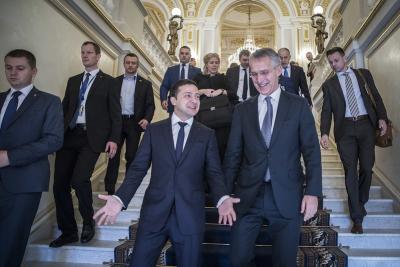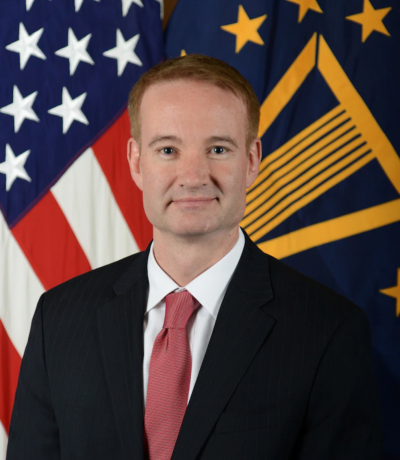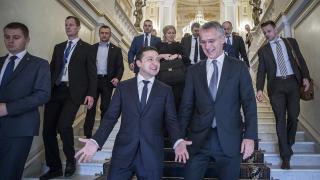April 9 — Following the regime change coup in February 2014 which toppled the elected government of Ukraine — which could not have occurred without the open support of the United States and governments in NATO — Russian leaders repeatedly warned that the entry of Ukraine into NATO was a "red line," which Russia could not allow. The steady eastward expansion of NATO, following the peaceful disbanding of the Warsaw Pact military alliance in 1991, broke pledges given to Soviet leaders that there was no intention to move NATO forces closer to the borders of Russia.
It is for this reason that the signing of presidential decree number 117/2021 by Ukraine's President Volodymyr Zelensky on March 24, 2021, which proclaims the official policy of Ukraine is to take back Crimea from Russia, led to a dramatic increase in tensions, which may have been the intention of this provocation. When there was a movement of Russian troops into the border area, which the Russians said was part of scheduled training maneuvers, and a reinforcement of Russian forces in Crimea, the U.S. raised the alert status of its military forces in Europe to the highest level. Skirmishes broke out between Ukrainian forces and the military units defending the Luhansk and Donetsk "breakaway republics", which included Ukrainian forces launching shells into Donbas, along with unconfirmed reports of the deaths of Ukrainian soldiers, breaking a shaky ceasefire.
Tensions soared again after U.S. President Biden told Zelensky that he is affirming the United States' "unwavering support for Ukraine's sovereignty and territorial integrity in the face of Russia's ongoing aggression in the Donbas and Crimea." Biden's talk with Zelensky was followed by a series of discussions by administration officials with their Ukrainian counterparts, including calls from Secretary of State Blinken, National Security Adviser Sullivan, Defense Secretary Austin and the Chairman of the U.S. Joint Chiefs of Staff, General Milley.
At the same time, Zelensky exhibited a flight forward mentality. On April 5 and 6, he spoke about the crisis, and Ukraine's desire to be accepted into NATO, with the U.K.'s Prime Minister Boris Johnson, Canada's P.M. Trudeau, and with NATO General Secretary Jens Stoltenberg. In his discussion with the latter, a report from his office stated that he called for a greater NATO presence in the Black Sea, which would be a "powerful deterrent to Russia," which he accused of continuing "the large-scale militarization of the region" and action which "hinders merchant shipping." He responded to the request that Ukraine carry out military reforms in order to qualify for membership by insisting that they are committed to making reforms, "but reforms alone will not stop Russia. NATO is the only way to end the war in the Donbas." Accepting Ukraine's NATO Membership Action Plan (MAP), he added, "will be a real signal for Russia."

President Zelensky, Ukraine, with NATO secretary General Jens Stoltenberg in 2019.
Source: NATO flickr
On April 6-7, the Chairman of NATO's Military Committee and senior military advisor to Stoltenberg, Air Chief Marshal Sir Stuart Peach was in Kiev, for a meeting with Zelensky. He also met with the Commander-in-chief of Ukraine's armed forces, Col.-Gen. Ruslan Khomchak. After his meeting with Zelensky, he said that NATO condemns Russia's "illegal annexation of Crimea, and its aggressive actions in eastern Ukraine," adding "Ukraine is one of NATO's closest and most important partners." The "annexation" of Crimea took place nearly seven years ago, after its population overwhelmingly voted to rejoin Russia.
As pressure to bring Ukraine into NATO builds, NATO is holding Defender Europe 2021 exercises. The purpose of these maneuvers, according to the representative of Ukraine in the Trilateral Contact Group on Donbas, Alexey Arestovich, on the YouTube channel UKRLife.TV, is to prepare for possible military confrontation with Russia. This exercise, he elaborated, is designed to coordinate actions, from the Baltic Sea to the Black Sea, to prepare for "war with Russia, the scenario of armed confrontation with Russia". The exercises will stretch through May and June, and will be the largest in twenty-five years, involving 28,000 forces from 26 nations, including Ukraine.
In light of these provocations, Kremlin spokesman Dmitry Peskov expressed doubt as to whether Ukrainian President Volodymyr Zelensky even controls the Ukrainian army along the line of contact, which the ceasefire established. “So far, we can’t see signs indicating that the Ukrainian side wants to somewhat calm down, drop bellicose rhetoric hidden behind the talk about some imaginary threat and take control of its army units that are deployed directly along the contact line [in Donbas] and that often become a source of provocations,” he said, reported TASS.
“It’s vital," he added, "to make sure that nothing incites the Ukrainian Armed Forces to launch hostilities against their own people, the people who live in the self-proclaimed republics.”
A Pattern Of Incitement
The Atlantic Council, a think tank dominated by war hawks from the U.S. and NATO countries, is among those institutions with ties to the Biden administration which has been fanning the flames for a NATO-Russian conflict over Ukraine. Notable is a February 16 report it published titled, "Why is Ukraine still not in NATO?" It included an interview given by Zelensky to Axios news service on January 23, 2021, just days after Biden's inauguration, in which he was asked what he would say to Biden when they first speak. Zelensky said he would ask a simple question: "Mr. President, why are we not in NATO yet?"
In this interview, he says that if Ukraine were already in NATO, "there would have been no escalation in the east of Ukraine." If Ukraine is targeted by the Kremlin now, "who is next? It could be any European country, it could be the United States." He warned that the west is facing not just threats from the Russian military, but "information warfare, cyber attacks." He added that while "sanctions are effective" in holding back Russia — referring to the attempt to shut down the Nord Stream 2 gas pipeline, which was pushed by Secretary of State Pompeo during Trump's presidency, and now by Biden and Blinken — they are not enough. He concluded by stating that the return of Crimea must be on the agenda. "Are you saying we should give up on Crimea?", he asked the interviewer.
Among the leading advisers to Biden on Ukraine is Michael Carpenter, who is a nonresident senior fellow with the Atlantic Council's Eurasia Center. Carpenter, who served as former Deputy Secretary of Defense for Russia, Ukraine, Eurasia and the Balkans during the Obama administration, and as special expert on Russia for the National Security Council, is also the Managing Director of the University of Pennsylvania's Biden Center for Diplomacy and Global Engagement. In 2018, he was the escort for Ukrainian neo-Nazi and government official Andriy Parubiy during his trip to Washington. When confronted about Parubiy's unrepentant public ties with the Nazi movement, which provided muscle for the 2014 coup, he defended him as a "patriot" and "great leader." Carpenter was the coauthor, with Biden, of an article published in the Council on Foreign Affairs journal {Foreign Affairs} in its January-February 2018 issue titled "How to Stand Up to the Kremlin: Defending Democracy Against Its Enemies''.

Michael Carpenter, leading advisor to Biden and promoter of empire.
In the article, they begin with the usual slanders against Russia and President Putin, that Russia "is brazenly assaulting the foundations of western democracy," using a "variety of overt and covert means." The Kremlin "harbors an erroneous but stubborn -- perhaps even obsessive -- belief that Washington is actively pursuing regime change in Russia," which includes a "conspiracy theory" that the U.S. was involved in engineering uprisings in areas surrounding Russia, including Ukraine in 2004 and 2014. (This particular statement is absurd: given Biden's personal role in overseeing the 2014 coup, along with other U.S. officials, such as then Assistant Secretary of State Victoria Nuland, it is hardly a "conspiracy theory" to identify the U.S. hand behind the coup!)
Among the proposals the two make is that the U.S. can best counter the Kremlin's "malign influence" is by "improving deterrence of Russian military aggression"; promoting energy security (for example, their insistence today that Nord Stream 2 must be shut down); and being prepared to"impose meaningful costs on Russia when they discover evidence of its misdeeds." Crucial to accomplishing this is to continue "to forward-deploy troops and military capabilities to eastern Europe", including consideration of the desire of Georgia and Ukraine to join NATO and the EU.
What Is The U.S. Position On Ukraine's Admission To NATO?
When U.S. officials were asked to comment on Zelensky's plea to be brought into NATO, no one was prepared to comment. Military officials are sticking to the position that Ukraine must first undergo "reforms" before they could be considered, which Zelensky said would not deter Russia. And Biden, despite agreeing with an interviewer in a set-up question, that he believes that Putin is a "killer", has stated that he does not want to begin a new Cold War.
But Biden's history as a war hawk is evident when it comes to his approach to Russia and Ukraine. There is a continuity from his role in overseeing the Maidan coup to his current statements. On April 30, 2014, just two months after the regime change coup in Kiev, Biden -- with Carpenter at his side -- told an audience at the CFR that Russia's concern about U.S. policy regarding Ukraine has "nothing to do with the enlargement of NATO. It was born in the Kremlin. It was born in Putin's mind." Describing himself as a "proud Atlanticist", he said that NATO and the Trans-Atlantic relationship "have never been more relevant than they are today," reaffirming the "solemn commitments" under Article 5 of the NATO treaty, to come to Ukraine's aid "in response to Russian aggression." In the event of Russian violations of Ukraine's sovereignty, "we have to be resolute in imposing costs." And in a pre-taste of what appears to be his administration's policy today, with the threat of sanctions against the Nord Stream 2 pipeline, he said then that, "when it comes to energy, Russia should not be able to use its resource as a political weapon against its neighbors."
On Ukraine, one unmistakable sign that Biden has not reconsidered the danger implicit in his support for the Maidan coup, is his appointment of Victoria Nuland to the number 3 position at the State Department, as Under-secretary for Political Affairs. Nuland is a hard-core neoconservative, who served as the on-the-ground coordinator of the 2014 Maidan coup under Biden. Part of the coalition she oversaw included the adherents of Ukraine's Nazi movement, the followers of Stepan Bandera and the Azov Battallion, who are today embedded in the state military and security apparatus, taking the point in the confrontation against the breakaway republics and Crimea. When it appeared that, shortly after his election, Zelensky was open to a diplomatic settlement with Putin, he and his supporters received death threats from these networks.






